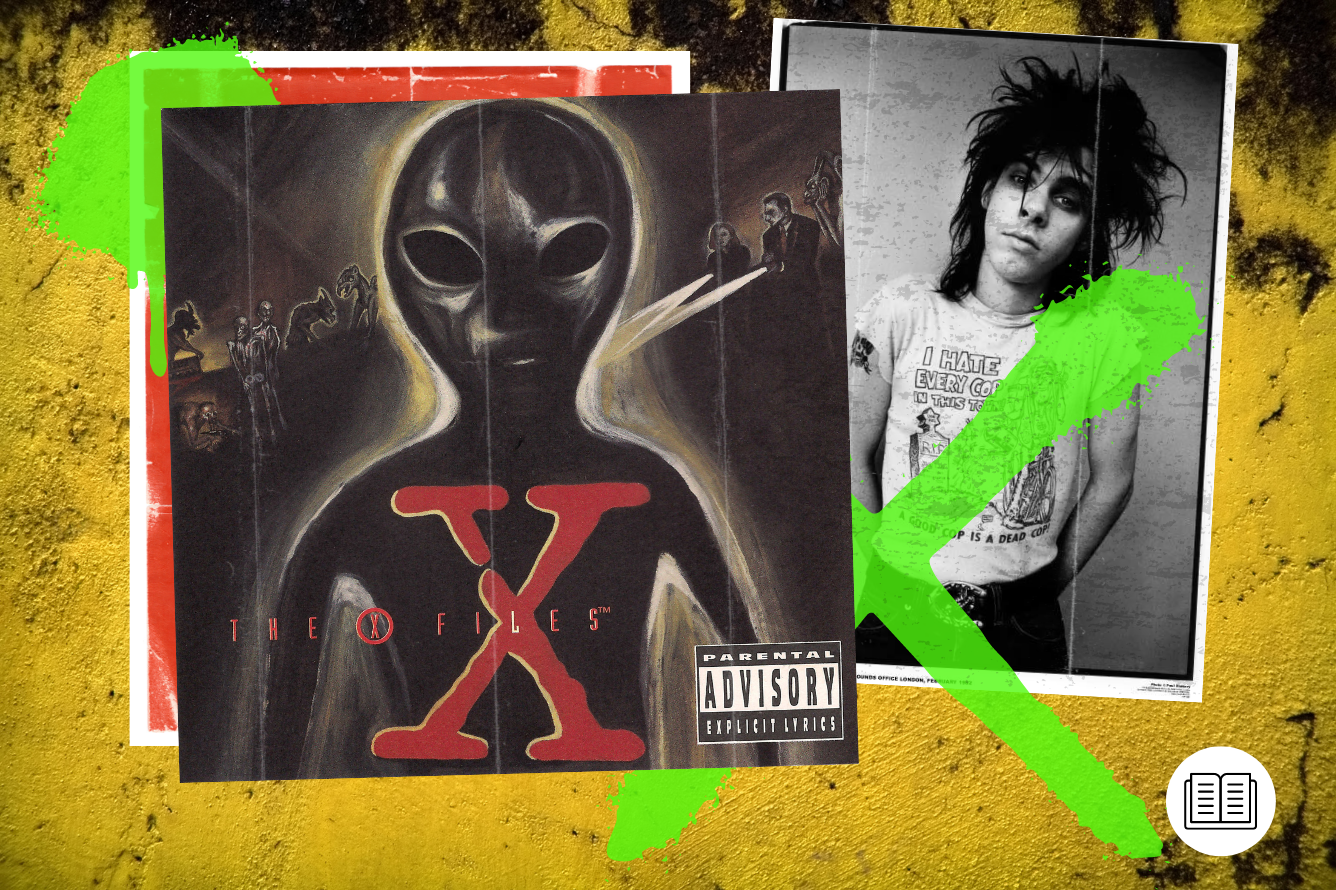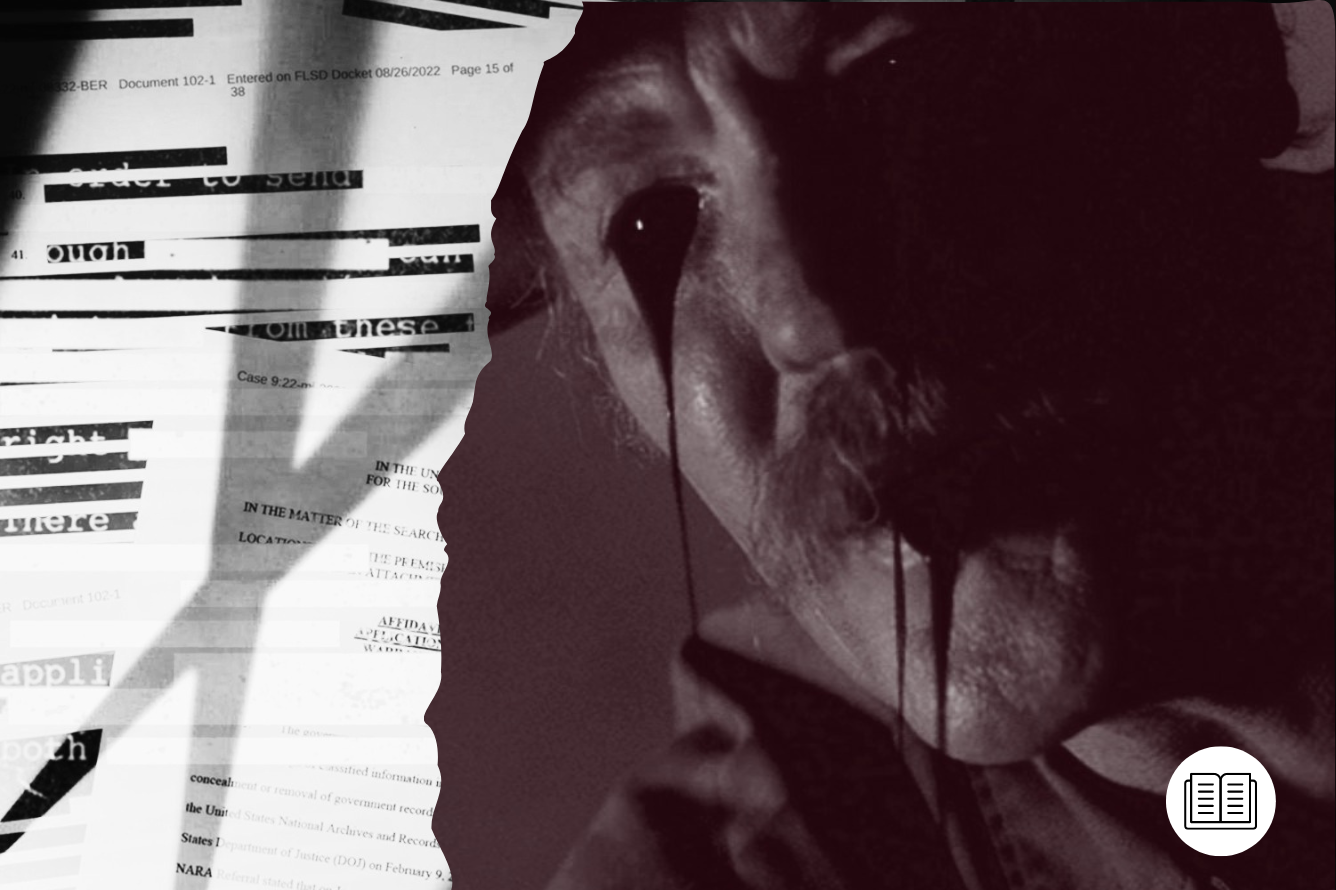She arrives swaddled in mystery, glimpsed set against clear blue sky through barren trees in the middle of the desert. Dressed in shades of grey set against her long black hair, staring pensively out into the distance. Special Agent Monica Reyes, designed to present “another point of view”, is introduced with even greater meaning and intentional significance than her friend and eventual partner, Special Agent John Doggett.
‘This Is Not Happening’ (S8, Ep14), the Season 8 episode of The X-Files in which Annabeth Gish’s character arrives, comes just past the middle of the season and serves as a key component of the emerging new mythology of the series. It was, in many respects, the episode fans had been waiting for since Season 7’s finale ‘Requiem’ (S7, Ep22) – the proper, bona fide return of David Duchovny’s legendary Fox Mulder, after guest appearances as an alien bounty hunter and in flashback before his disappearance. The fact he turned up dead was an altogether different surprise.

Season 8, to this point, had reset the storytelling board. Doggett’s arrival in The X-Files episode ‘Within’ (S8, Ep1), ostensibly as the man looking for Mulder, establishes a new partnership with Dana Scully that over the course of ten or more episodes develops into a trusting dynamic built on investigating cases that eschewed the glamorous or comic adventures of she and Mulder and dug deeper into earthy true crime – a boy who vanished years before turning up no older in ‘Invocation’ (S8, Ep5) or in ‘Redrum’ (S8, Ep6) an honest lawyer reliving the day he supposedly killed his wife over and over. The X-Files was maturing back into the case-driven series of its early years that the iconic nature of Mulder and Scully’s partnership and romantic entanglement had naturally steered the series away from.
All the while, the alien mythology that had driven so many years of the series rippled underneath many of these stories in the form of the absent Mulder, who audiences knew had been abducted by aliens we had grown very familiar with, as indeed was Scully herself. The problem was the belief of others. Scully would always have her doubts as part of her character DNA but The X-Files episodes ‘Within’ (S8, Ep1) and ‘Without’ (S8, Ep2) established the fact alien bounty hunters and mass abductions were phenomena she had grown to accept, against her better judgment: “I have seen things that I cannot explain. I have observed phenomena that I cannot deny.” By that logic, Doggett needed to align himself in the role Scully had played for many years opposite Mulder – the complete skeptic, thanks to his lack of experience with the supernatural and the alien.
This was also a logical move for the established natural dynamic of The X-Files at large. Chris Carter built the series on the concept of the believer and skeptic working hand in hand. Mulder might almost always have turned out right in his suppositions (where would the fun be if he wasn’t?) but Scully’s scientific and rational point of view is where the drama, philosophy, and humanity lay; the counterpoint that allowed us to believe the improbable was possible. In removing Mulder, the faithful believer, Scully struggled to fill a role that didn’t come naturally to her, as The X-Files episode ‘Badlaa’ (S8, Ep10) neatly explored. There was a space for someone open to extreme possibilities.
Another Point of View: Introducing Monica Reyes
Carter and co-executive producer Frank Spotnitz understood, going into writing the eighth season, that such a character—in Mulder’s absence—would be necessary. They also felt, in contrast to Gillian Anderson’s long-term portrayal of the skeptic (which had itself been a deliberate inversion of long-accepted gender stereotypes), that the new believer should be female, equally in part to equal up a recurring character base that had always pivoted heavily masculine throughout the series. She was first named Karen Miller, later Jane Jones. She was eventually christened Monica Reyes after the art gallery-owning acquaintance of Carter who lived in Vancouver, the spiritual home of The X-Files where it had filmed the first five seasons, and would eventually film the revival years of the show.
Annabeth Gish, much like Robert Patrick, had been working in film and television as a recognizable actor in numerous high-profile projects at the point she was cast in the role, in contrast to Duchovny and Anderson arriving as relative unknowns, appearing in films such as Oliver Stone’s Nixon, Lawrence Kasdan’s Wyatt Earp and late-1980s coming of age picture Mystic Pizza, for which she was probably best known. In The Complete X-Files (2008), she discussed the intent for Reyes as a character from the outset:
“With Monica they wanted an external kind of radiance. Chris really wanted Monica to be a sunny force, which is hard to play sometimes. But it’s a natural instinct for me; I can find happiness in the midst of darkness.”
This duality is more than apparent in Reyes’ very first scene, close to midway through ‘This Is Not Happening’. With many of the residents of Bellefleur, Oregon, who were abducted alongside Mulder in ‘Requiem’ returning suddenly, and in the wake of the subsequent disappearance of the newest returnee, Theresa Hoese (Sarah Koskoff), Scully along with boss/ally Walter Skinner (Mitch Pileggi) is brought out into the middle of nowhere by Doggett to meet Reyes. There is no preamble to her arrival. There has been no previous mention of her this season to establish this moment. Reyes simply arrives, fully formed, into the narrative as even more of an outsider than Doggett in ‘Within’. Her presence is a different kind of ambush, one not cloaked in falsehood as Doggett’s was.

As Scully, and the audience, are brought to the mysterious woman on the hill, Doggett provides an element of her backstory. “She’s got her master’s in religious studies. Her specialization is ritualistic crime.” Immediately, we find in Reyes are welded two key aspects to the characters of Mulder and Scully. Ritualistic crime leans toward Mulder’s pre-X-Files specialty as a star profiler in the Violent Crimes section of the FBI, catching the kind of serial killers the writer Thomas Harris would be proud of. Religious studies, however, align her more with Scully’s own deep-rooted faith in Christianity which drives much of her skepticism and serves as the only aspect of belief Mulder never comes to terms with. Reyes is, in that sense, designed to bridge the gap between our two beloved agents.
In The Complete X-Files (2008), series writer John Shiban has confirmed this was part of the intention, albeit involving both of the show’s new additions:
“It was a big challenge to deal with David Duchovny’s departure in season eight, and, in a way, we brought in both Doggett and Reyes to get both sides of Mulder’s personality.”
Carter, however, suggested the characters were designed to reflect opposite versions of the dynamic audiences had grown used to:
“As much as Robert Patrick was unlike Mulder, we needed someone who was equally unlike Scully.”
I Just Get These Feelings: Setting Reyes Apart
Undoubtedly in part thanks to Gish’s casting, and her own philosophy on playing Monica, Reyes instantly cuts a radically different figure from anyone we had previously seen on The X-Files in this capacity. We first see her throwing to the floor and stubbing out a cigarette which intuitive fans seeking connective tissue might see as a gigantic hint to the darker turn the character will take in the revival series, especially given she later sports a pack of Morley’s in her car, but which in truth is clearly designed to display Reyes’ grounded sense of edgy fallibility. “I know it’s not very FBI of me, but I’m really trying to quit,” Reyes admits, somewhat guiltily, to a silent and not judging (but totally judging) Scully and Skinner.

Smoking on screen, as Big Tobacco was being publicly challenged and the appeal of cigarettes generally was beginning to wane amongst the populous, was growing increasingly rare. Smoking on The X-Files had previously been associated specifically with the series’ arch-villain and therefore had a very specific cache within the lexicon of the show. The previous season had even, in The X-Files episode ‘Brand-X’ (S7, Ep18), very much a nod to Michael Mann’s 1999 film The Insider, devoted an episode to Morley’s, the company profiting off cigarettes that contained an organism that was killing those who smoked them. Reyes indulging the habit is therefore designed to show she comes from a different world than the ordered, rather staid, and chaste one Scully has crystallized herself within, as had Mulder.
While their adventures were outlandish and exciting, both agents have led rather monastic, outwardly rather sexless, and at points lonely lives across the seven years previous. There is no sense of this with Monica. The habit, her broad smile, the slightly kooky, awkward humor in her remark about the barren desert being “beautiful country” (later fully explored in The X-Files episode ‘Existence’ (S8, Ep21) as she sings whale song to a Scully whose trust she has earned), all suggest a vibrant, sexual woman who has lived in the world. She very quickly establishes a very similar place that we briefly saw Scully’s sister Melissa hold, before her tragic demise, many years before, a New Age belief in metaphysical spirituality:
“I believe there are energies in the universe. It might sound kind of cosmic but I think I’m sensitive to them. I mean, I get these feelings.”

This is why, in part, Scully very quickly warms to Reyes, despite her initial skepticism and confusion as to Reyes’ viewpoint. Reyes provides a deliberate counterpoint to Scully’s original disbelief in anything non-scientific (outside of religious faith) and Mulder’s freewheeling belief in everything paranormal: “Let’s just say I don’t not believe. As I said, I try to stay open.” Though she too suffers ostracism from the New Orleans field office as Mulder did in Washington for her openness to Satanic ritual abuse, Monica is not paradigmatic of a distinct point of view on the work of the X-Files. She is ready to believe but also skeptical. She also provides a key link to the exploration of Doggett’s own past, having been part of the search for a son we by now understand was murdered as a child. She understands fear and how it connects directly with belief.
I Want to Believe: The Reappraisal of Monica Reyes
A couple of episodes later, in The X-Files episode ‘Empedocles’ (S8, Ep17), when she finally meets and works with a returned and distinctly de-motivated Mulder, Reyes’ entire case—which connects to Doggett’s deceased son—revolves around fear and the spread of evil like a virus. She admits to crying her eyes out during the discovery of Doggett’s son. She approaches cases with professionalism but less distance than either Mulder and Scully, both of whom became emotionally embroiled and compromised by their own family dramas and connections to the conspiracy they exposed, but Reyes feels in these early episodes like the kind of outside troublemaker Mulder himself was in the early years of The X-Files. Yet her position comes from a place of embracing the spiritual nature of the unknown in a manner Mulder avoided and Scully found largely impossible.
As Doggett’s own wild-eyed confrontation with the cosmic and otherworldly makes him relatable to use, so too does Reyes’ open willingness to believe, to face these fears. They are both, in that sense, more rounded creations than Mulder and Scully but, equally, they became harder for audiences to immediately warm to. Gish claims in The Complete X-Files (2008) she was pre-warned, in the wake of fan animus to Patrick’s casting, to expect hostility:
“Chris advocated my not getting too familiar with anything. His thing was “Don’t go online”. I’m sure he was just trying to safeguard me from the criticisms they all knew would come my way.”
In subsequent years, with the emergence of social media and despite Reyes’ later, controversial character development, an entire community has formed around fondness for Monica, and Gish especially. The ‘Gishies’ champion Reyes’ place within The X-Files pantheon as the lost opportunity it ended up being, given the strength of her introduction and the consistent dynamic she had with Patrick as their partnership took central stage in the ninth, and – for a time – last season of the show. Even back in 2002, many fans—myself included—were ready for a whole new lease of life, post-Mulder and Scully, for the series with Doggett and Reyes completely at the helm exploring a secret, weird, underground America in the 21st Century.
Maybe Reyes, as with Doggett, will serve as pioneers for a future in which The X-Files is unafraid to embrace characters such as those. Maybe we should all hold dear Reyes’ words to Scully in ‘This Is Not Happening’:
“Maybe you can try and stay open, too.”
This article was first published on July 26th, 2022, on the original Companion website.
The cost of your membership has allowed us to mentor new writers and allowed us to reflect the diversity of voices within fandom. None of this is possible without you. Thank you. 🙂









